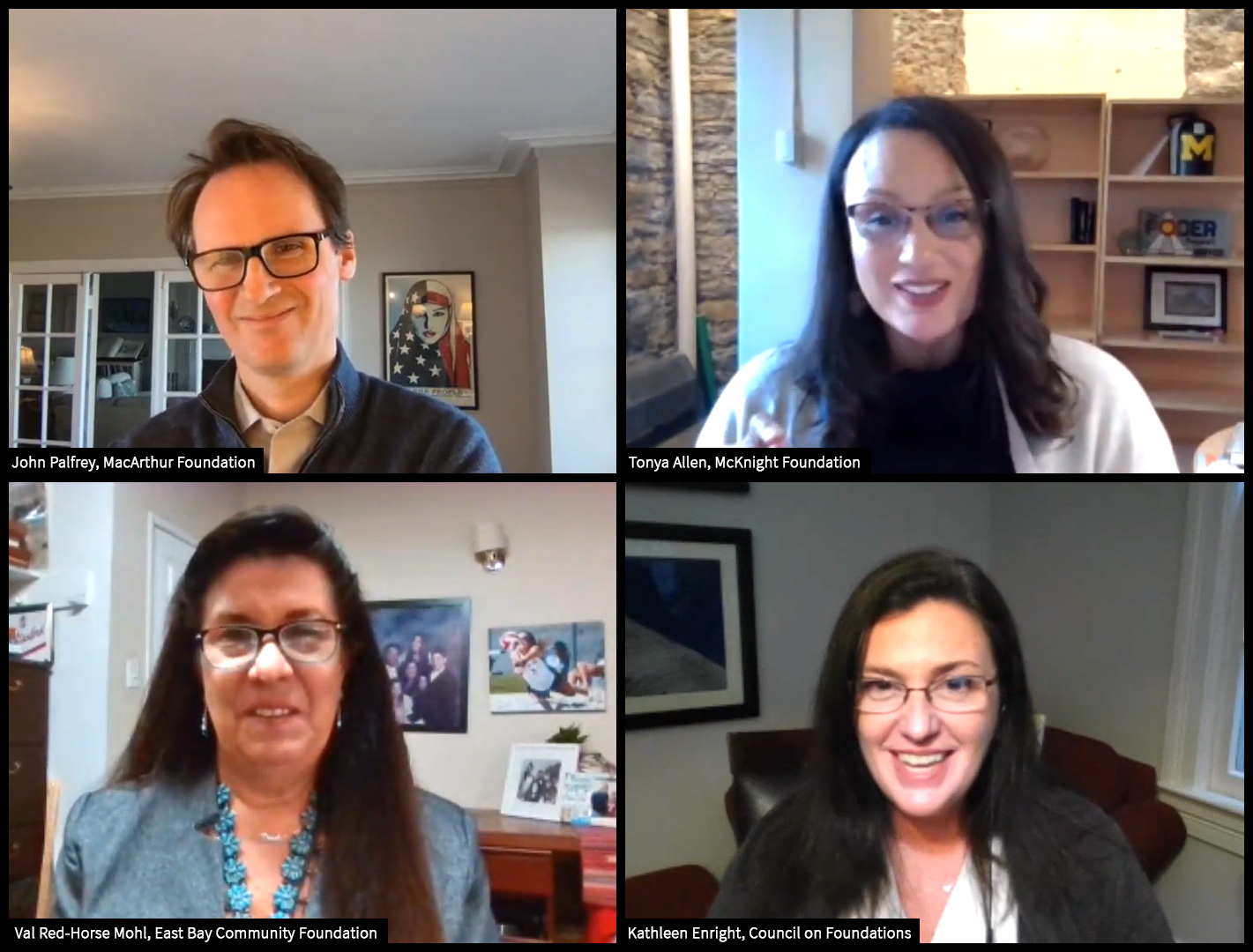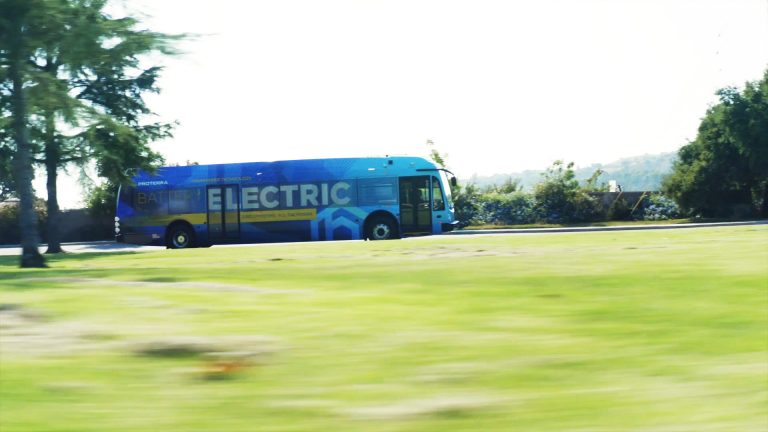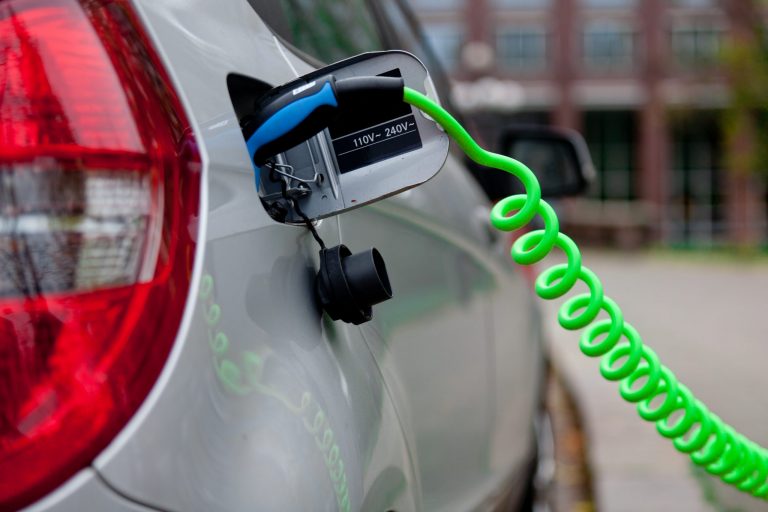On December 6, 2021, just weeks after the McKnight Foundation announced our commitment to achieve net zero across our endowment, Tonya Allen joined the Council on Foundations and other leaders to talk about how foundations can look beyond grantmaking to more fully serve their missions through their endowment investments.
Kathleen Enright, president and CEO of the ምክር ቤቶች, moderated the discussion with Tonya, Valerie Red-Horse Mohl, CFO of East Bay Community Foundation, and John Palfrey, president and CEO of የማክአርተር ፋውንዴሽን.
The speakers shared insights from their experiences investing in climate solutions and hiring diverse fund managers. Below are key takeaways.

SEEKING ALIGNMENT
Tonya Allen: “If our endowment, which is 95% of our assets, is working against our program goals, then we’re getting beat before we even get into the office to make a grant.”
“To say it another way, we have to be in alignment, because if we’re not then we’re undermining all of the good that we’re trying to achieve,” Tonya continued. “Our colleague Darren Walker from the Ford Foundation said when they recently made the commitment to divest their portfolio, ‘What’s the purpose of perpetuity if you don’t have a planet?’ That right there is a microphone drop. It’s so critical, because we cannot put our heads in the sand on this, and we know that this is not a programmatic shift, it’s really a societal shift.”
EXPLORING PATHWAYS
Tonya Allen: “Net zero is a comprehensive approach to McKnight’s investment management. We will scour every corner of our endowment for emissions.”
“We want to reduce greenhouse gas emissions across the entire investment portfolio, and we want to pay particular attention to fossil fuels,” Tonya continued. “But we don’t just stop there, that’s what the net zero commitment is really about. We also want to send a signal to the market that there’s an expectation for them to decarbonize their portfolios. We also have to invest in companies helping us create a carbon-free economy. The magnitude of the climate crisis requires that we take bold and deliberate action. We’re just one foundation. If we combined our efforts across philanthropy we could enhance our evolution to a more climate resilient and carbon-free society and economy.”
Val Red-Horse Mohl: “Racial equity and diversity has been part of the fabric of East Bay Community Foundation since we started.”
“We wanted to reach 100% mission alignment in all of our investments. We got very high grades in our programming and grantmaking—we have some amazing programs that support Black-led organizations. A statistic that makes my mouth drop is that 98% of financial assets globally are managed by white men. You start to realize, ‘Is it racism or is it a system that needs to be changed?’ It might be a bit of both. What we did that I hope can be replicated is we sort of redefined risk and how we look at selection of managers. There has been this misunderstanding for decades that in order to invest with racial equity or impact you have to take some kind of concessionary return, and that couldn’t be further from the truth. Right now all of the money that we have invested in our diverse managers are the highest performing funds. Our diverse managers are showing that we can make money and do the right thing at the same time.”
John Palfrey: “MacArthur is divesting from fossil fuels at the same time as we’re seeking to invest very rapidly in clean energy and equitable solutions.”
“We think there’s enormous promise in doing that. The other piece of aggressive alignment we’re doing is looking at our asset managers and focusing on the percentage of those that are led by people of color and women and bringing that number up in a thoughtful and considerate way. Not only can you do this, you can get the same returns if not better. So if anyone is worried about their fiduciary duty, I’m not—in terms doing the alignment with MacArthur’s endowment.”
WHAT WILL IT TAKE?
Tonya Allen: “We want people to understand that this is a long-term commitment.”
“The big picture here is that this is not something you start and it turns overnight. It’s not one and done. It’s not a fad. This has to really be the way we do our work going forward, and we have to give ourselves the time and energy to restructure our systems and approach so the work is durable, not episodic.”
“At McKnight our mission is to advance a more just, creative, abundant future where people and planet thrive. When we renewed our mission in 2019 we also built in our commitment to climate and racial equity. We have made deep investments in both of those areas. And part of what I have tried to do since my arrival is make sure that we are not just focusing on these two things as our headlines, but that they also become the throughlines in every aspect of our work. We have to be strong advocates and purpose driven in every move that we make.”
“As a result of that, we were able to build off of the foundation’s strong history of mission investment. We right now have about $500 million committed to public and private impact investments that provide the ideas, technology, software, and services to decarbonize the economy. As we’ve done this work over the past seven years, 40% of our $3 billion endowment now has some kind of mission alignment and our impact investments are uncapped. I think all of this is one of the reason’s that the board was able to make this decision to go net zero. It was the logical next step to align our assets more fully with our climate change mission.”
GETTING STARTED
John Palfrey: “First, just start. Second, know that it’s doable.”
“Start with education,” said Val Red-Horse Mohl. “Education around terminology, education around what the investment policy statement means and what the intention is. And if you can, make this the mission of someone on staff, not just external consultants.”
“Our board wrestled the most with only being the second foundation to make a net zero commitment,” Tonya added. “We spent time with our board talking to other institutions who had made a net zero commitment—like Harvard and University of Michigan endowments. What the board heard from them that they took comfort in is that there is not a clear path, but we’re all committed to figuring it out together. And then having in-house talent and the data to know where you’re starting from.
MARKET SIGNALS
Tonya Allen: “We can’t underestimate the power of advocacy as shareholders and with consultants.”
“One of our tenets across our portfolio is to have shareholder activism,” Tonya noted. “Show up in those conversations. This is about our role as advocates around how our endowments are being used to either support or undermine our missions. We also must push on our consultants. Keep raising the topics. It’s not just what we do with the portfolio. The more the consultants change, the more diverse and climate resilient our options and portfolios will become.”
TRACKING RESULTS
Tonya Allen: “We’re always trying to triangulate three things: impact, returns, and learning.”
“We get a report every year that shows us the actual impact that we’re having in a number of areas in addition to our financial returns. We also count a learning impact. We know that when we’re making these mission-aligned investments, we should be learning from that on our programmatic side. Because we know we need to understand how economic actors are working, advancing and how to shift and change them so that our grantmaking is complementary to our economic investment and so that those endowment investments are complementary to our grantmaking.”
WHAT'S NEXT?
Tonya Allen: “We want to deepen our practice and share it.”
“We just made this net zero commitment and we’re trying to grow our investment in diverse fund managers. We want to get really good at those two things and make it accessible so that we are providing support for others in the field that want to make this leap. We are all in this together—this is not about who’s first and who’s second (and by the way, David Rockefeller Fund was first on net zero). It’s not about how far we can go alone, it’s about how far we can go together.”


